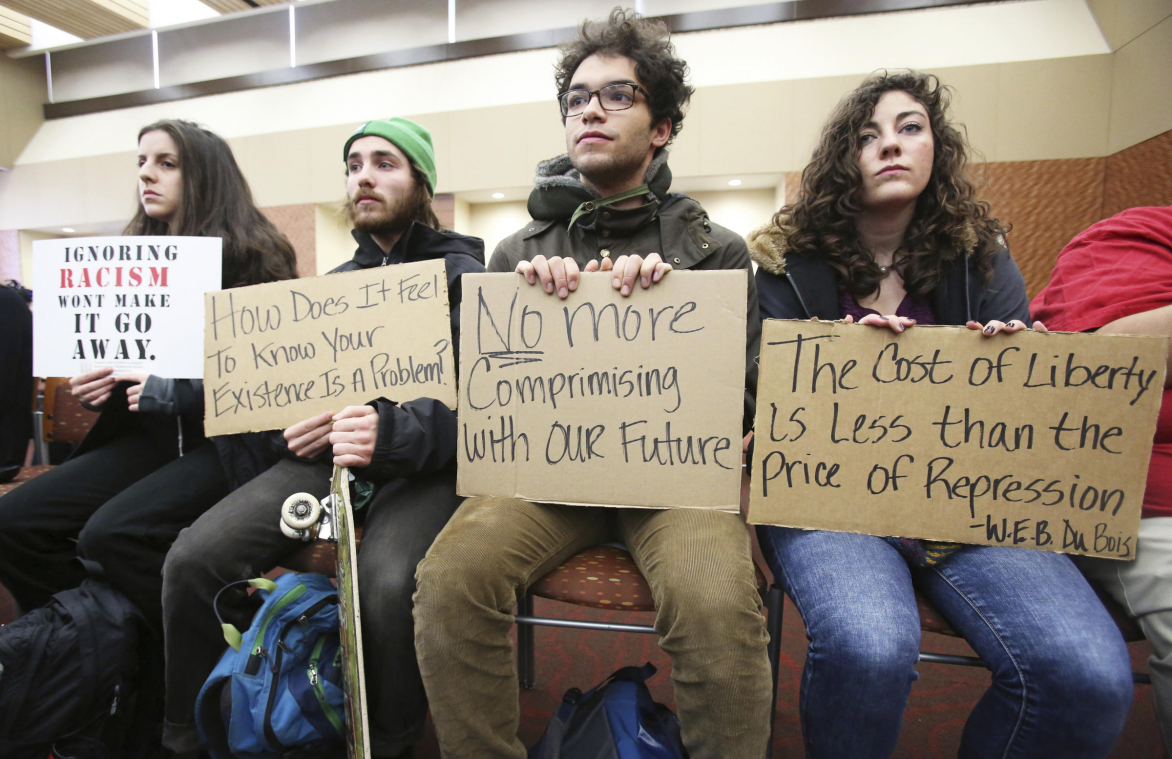By TODD RICHMOND, Associated Press
MADISON, Wis. (AP) — The fight over racial equity and free speech on Wisconsin college campuses is intensifying, mirroring a national battle as Republicans work to close campus diversity offices and demand that students and faculty treat conservative speakers with respect.
In the past two weeks, the state’s top Republican announced a push to defund the University of Wisconsin System’s diversity efforts — a move the Democratic governor lambasted as ridiculous. Nonetheless, the UW System’s chief announced May 11 that he has barred schools from asking job applicants how they would support diversity.
Meanwhile, a UW-Madison student has posted racial slurs online, triggering bitter protests but no announced discipline. And a state medical college canceled a diversity symposium featuring Republican U.S. Sen. Ron Johnson out of concerns the discussion would be too disruptive, resulting in cries of bias from conservatives.
Amid that backdrop, Republican legislative leaders held a hearing May 11 with only invited speakers to discuss “how the lack of free speech and intellectual diversity on college campuses affects the quality of higher education.”
“I think people are talking about viewpoint diversity as being as important or more important than other types of diversity,” said Republican Rep. David Murphy, chairman of the state Assembly’s colleges committee, who presided over the hearing. “And I think (diversity efforts aren’t) showing any benefits.”
Paulette Granberry Russell, president of the National Association of Diversity Officers in Higher Education, said it was disheartening to see a hearing on free speech with only invited speakers. She said the GOP was trying to paint diversity offices as giving minorities an unfair advantage when they’re only trying to help everyone understand a broad range of perspectives.
“Contrary to those opposed to these offices, our work includes protecting free speech,” she said.
Republicans argue that diversity offices, designed to help minorities navigate academia, only heighten racial tensions. And the GOP has maintained for years that colleges don’t give conservative presenters the same opportunities as liberals to speak on campus.
A survey released in February by the UW System, which includes 13 four-year schools, found almost half of the students who responded at least somewhat agree that administrators should bar controversial speakers if some students find the message offensive.
The issues have bubbled to the forefront this month, starting with Assembly Speaker Robin Vos’ announcement last week that he wants to defund campus diversity offices. He called the offices a waste of taxpayer dollars and said they exacerbate the racial divide.
Democratic Gov. Tony Evers has called Vos’ proposal “ridiculous,” but Vos’ plan tracks with a national GOP push to dismantle campus diversity offices.
Republican lawmakers in at least a dozen states have proposed more than 30 diversity, equity and inclusion efforts in higher education, according to an analysis by The Associated Press using the bill-tracking software Plural. Some proposals would ban DEI offices or any funding for them. Others would forbid administrators from considering diversity as part of the hiring or admissions process.
Facing potential budget cuts, UW System President Jay Rothman announced Thursday morning, May 11, that he had ordered chancellors on Wednesday to stop asking job seekers to supply statements on their applications describing how they would support equity and diversity.
Asked during a news conference if the move was a concession to Vos, Rothman responded by saying applicants may view the requirement as a “political litmus test” and not apply, hurting recruitment efforts.
Last week a white UW-Madison student posted a racist screed online in which she said she wanted to see some black people enslaved so she could abuse them. The post triggered two days of protests on Wisconsin’s flagship campus, with students demanding the student be expelled. University officials condemned the posting but said they couldn’t take action against legal free speech.
Meanwhile, officials at the Medical College of Wisconsin decided to cancel Friday’s campus symposium focusing on “the uses and abuses” of government-sponsored diversity programming on college campuses and in medical, science and tech education.
The college’s president, John Raymond Sr., sent a message May 4 to students and staff saying he had canceled the symposium because discussions about the event have become “unacceptably disruptive.” Raymond issued the message on the same day as one of the UW-Madison protests.
Johnson was slated to take part in the symposium along Murphy and John Sailer, policy director at the National Association of Scholars, a conservative group that advocates against diversity policies. Sailer posted a copy of a letter that faculty sent to Raymond on April 30 saying they opposed the “pseudo-academic and potentially harmful meeting.”
Sailer tweeted that the letter was a “textbook hecklers veto.” Johnson’s office said the symposium would now be held online, but the senator said in a statement that he hoped to meet with medical college leaders to discuss why they felt they couldn’t host the event.
Murphy kicked off Thursday’s hearing by complaining that the medical college had “canceled” him.
Daniel Hughes, who said he is a student at the college, told the committee that the institution leans so far left that its diversity stances sometimes trump approaching problems scientifically. For example, he said he’d been taught that biological differences between races are a result of systemic racism, not genetics.
Democratic state Rep. Katrina Shankland questioned Hughes’ claims, saying there was no way to verify them since no one else from the college was invited to speak. A spokeswoman for the medical college didn’t immediately respond to a message seeking comment Thursday.
Rothman addressed the committee for two hours, repeating his mantra that inclusion must mean something or the system will lose potential students and faculty.
The Free Speech Center newsletter offers a digest of First Amendment and news media-related news every other week. Subscribe for free here: https://bit.ly/3kG9uiJ

